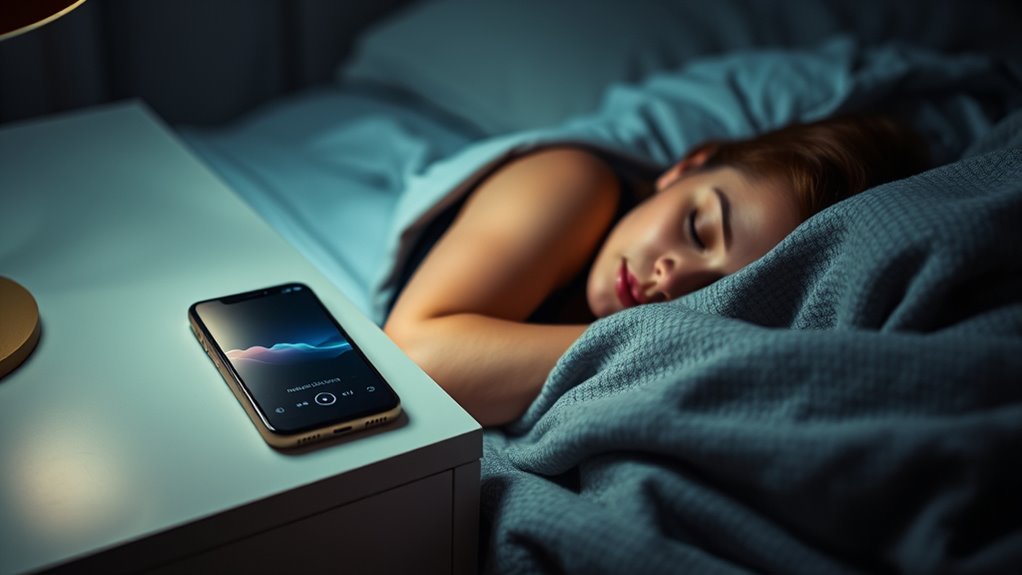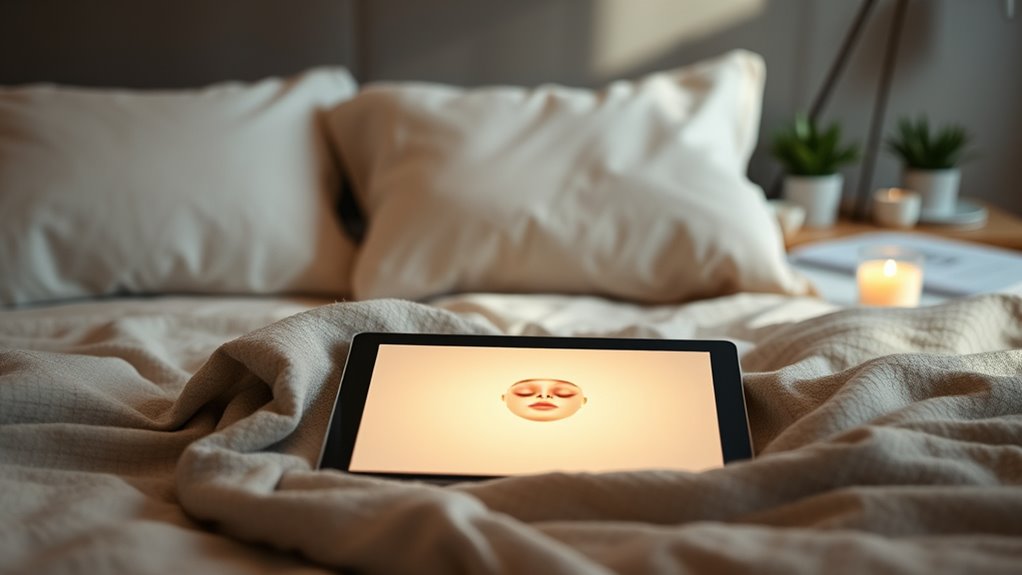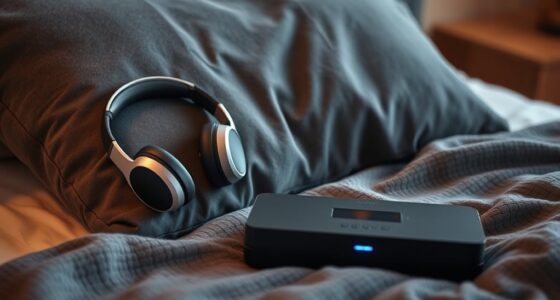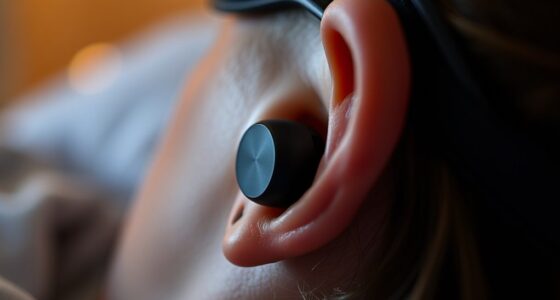Using meditation apps can greatly boost your sleep quality by helping you relax and create calming bedtime routines. They guide you through breathing exercises, progressive muscle relaxation, and visualization, making it easier to let go of racing thoughts and worries. Consistently sticking to these practices helps train your body to recognize bedtime cues and promotes more restorative sleep. Keep exploring, and you’ll discover how small daily habits can transform your nights.
Key Takeaways
- Guided meditations in apps promote relaxation and help transition from stress to sleep, improving sleep onset and quality.
- Consistent nightly routines using meditation apps reinforce sleep habits and reduce bedtime anxiety.
- Mindfulness practices train individuals to let go of racing thoughts, leading to more restorative sleep cycles.
- Many apps offer personalized insights and tracking, enabling tailored routines for better sleep management.
- Incorporating short daily mindfulness sessions enhances overall sleep hygiene with minimal lifestyle changes.

Have you ever wondered if meditation apps can actually improve your sleep? It’s a common question, especially as more people turn to digital tools to help manage stress and insomnia. The truth is, these apps often incorporate mindfulness practices that can profoundly enhance your sleep hygiene. Mindfulness practices, which involve paying attention to your breath, body sensations, and thoughts without judgment, are proven to calm your mind before bedtime. When you use a meditation app regularly, you’re training yourself to let go of racing thoughts and worries that keep you awake. This mental shift can create a more conducive environment for restful sleep, especially if you’ve struggled with insomnia or restless nights.
Meditation apps can help calm your mind and improve sleep quality through mindfulness practices.
Good sleep hygiene is essential, and meditation apps can serve as a practical addition to your nightly routine. Sleep hygiene refers to habits and environmental factors that promote quality sleep, such as maintaining a consistent sleep schedule, reducing screen time before bed, and creating a comfortable sleep environment. Many apps include guided meditations tailored specifically for sleep, helping you wind down and transition from daytime stressors to a state of relaxation. These guided sessions often focus on breathing exercises, progressive muscle relaxation, or visualization techniques that ease your body into a restful state. By integrating these practices into your nightly routine, you reinforce positive sleep habits that can lead to longer, more restorative sleep cycles.
Using a meditation app also encourages a more disciplined approach to your sleep hygiene. When you commit to daily mindfulness practices, you’re less likely to stay up late scrolling or engaging in stimulating activities. Instead, you set aside a dedicated time to disconnect and prioritize your well-being. Over time, this consistency helps your body recognize when it’s time to unwind, making it easier to fall asleep naturally. Additionally, many apps track your progress, providing motivation and insight into your sleep patterns, which can help you identify habits that might be interfering with your rest.
Incorporating mindfulness practices through meditation apps doesn’t require a major lifestyle overhaul. A few minutes each night can make a difference, especially when paired with good sleep hygiene. The combination of relaxing guided meditations, breathing exercises, and a consistent routine helps reframe your relationship with sleep, making bedtime a more peaceful and restorative experience. So, if you’re looking for a simple, effective way to improve your sleep quality, exploring meditation apps might be just what you need to create a calming pre-sleep ritual that supports your overall well-being. Additionally, some apps offer personalized sleep insights that can help tailor your routines even further.

Free Guided Meditation App – Sleep and Relaxation
1. Guided Meditation for Sleep
As an affiliate, we earn on qualifying purchases.
As an affiliate, we earn on qualifying purchases.
Frequently Asked Questions
Can Meditation Apps Replace Professional Sleep Therapy?
You wonder if meditation apps can replace professional sleep therapy, but they shouldn’t. While they offer convenience, they lack personalized guidance that a sleep therapist provides. To improve sleep, consider a digital detox before bed and practice mindfulness training to reduce stress. If sleep problems persist, consulting a professional ensures you receive tailored strategies, making a combination of apps and expert help the best approach for restful nights.
Are There Any Side Effects From Using Meditation Apps Nightly?
Think of nightly meditation as planting a seed; it can grow into restful sleep, but overdoing it may cause weeds. You might develop a potential dependency, relying on the app for sleep instead of natural cues. Also, if you experience sensory overload from too many notifications or sounds, it can interfere with relaxation. Moderation helps guarantee meditation remains a helpful tool, not a sleep barrier.
How Do Meditation Apps Compare to Traditional Relaxation Techniques?
You might find that meditation apps offer a convenient way to practice mindfulness and breathing exercises, making them comparable to traditional relaxation techniques. While apps provide guided sessions, in-person methods like yoga or deep breathing can offer more personalized feedback. Both approaches help reduce stress and promote relaxation. Your choice depends on your preferences, but incorporating mindfulness practices through apps can be an effective, accessible alternative to conventional methods.
Do Meditation Apps Work Equally Well for All Age Groups?
It might seem like meditation apps work equally well for everyone, but that’s not quite true. Their age-specific effectiveness varies because younger users often have more tech familiarity, making it easier to stick with guided sessions. Older adults might find them less intuitive or less engaging. So, your experience depends on your comfort with technology and your unique needs, meaning these apps aren’t universally effective across all age groups.
Are Free Meditation Apps as Effective as Paid Versions?
You might wonder if free meditation apps are as effective as paid ones. Generally, free trials let you test features before committing, but paid versions often offer more extensive content. User testimonials show many find both effective, but paid apps tend to provide personalized guidance. Ultimately, the effectiveness depends on your consistency and preferences rather than price. Try free trials first to see what works best for you.

Free Guided Meditation App – Sleep and Relaxation
1. Guided Meditation for Sleep
As an affiliate, we earn on qualifying purchases.
As an affiliate, we earn on qualifying purchases.
Conclusion
If you think meditation apps won’t make a difference, think again. They’re accessible tools that help calm your mind and improve sleep, even if you’ve tried everything else. While results may vary, many users notice better sleep quality with consistent practice. So, don’t dismiss these apps before giving them a shot. Incorporate them into your routine, and you might find yourself drifting into restful sleep more easily than you expected.

Mindfulness for Insomnia: A Four-Week Guided Program to Relax Your Body, Calm Your Mind, and Get the Sleep You Need
As an affiliate, we earn on qualifying purchases.
As an affiliate, we earn on qualifying purchases.

QYZHARYX Smart Bracelet,Health and Fitness Tracker,24/7 Heart Monitor & Sleep Tracker, Multi-Sport Tracker Wristband with Free APP (Black)
Simple & Screen-Free Design – Easy to use and ultra-lightweight, comfortable for all-day wear without the distraction of…
As an affiliate, we earn on qualifying purchases.
As an affiliate, we earn on qualifying purchases.









